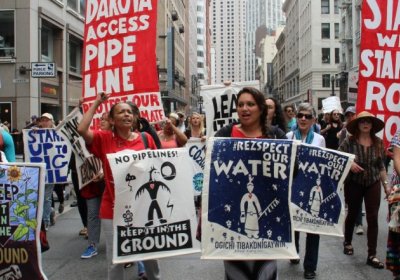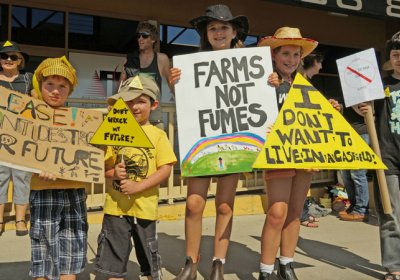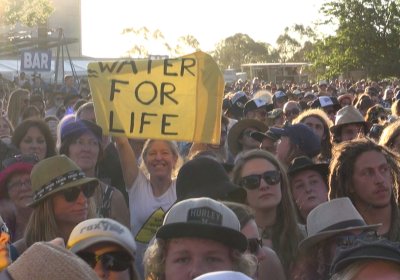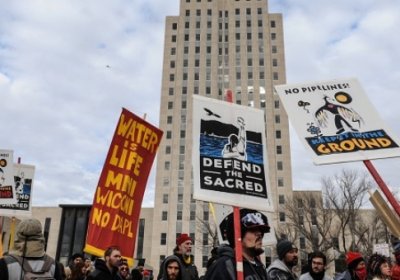With the passage of the Climate Change Act (CCA) that mandates a target of zero net emissions by 2050, Victoria is formally in the leadership among state and federal governments.
Gas
On March 7, Victoria became the first state in Australia to permanently ban hydraulic fracturing (“fracking”), the dangerous process used to mine unconventional gas. This important victory sets the stage for other states to follow.
The Victorian government has also decided to extend the moratorium on onshore conventional gas drilling until June 30, 2020.
A Lakota prophecy tells of a mythic Black Snake that will move underground and bring destruction to the Earth. The “seventh sign” in Hopi prophecy involves the ocean turning black and bringing death to many sea-dwelling creatures.
It does not take an over-active imagination to make a connection between these images and oil pipelines and spills.
Santos released an Environmental Impact Statement (EIS) on February 1, declaring it intended to develop a controversial gas reserve in Narrabri, in north western New South Wales.
Farmers, townspeople, Traditional Owners and environmentalists are opposed to the proposed gas field: an overwhelming 96% of landholders, representing 3.2 million hectares of land over which Santos holds leases, have declared their lands “gasfield free”.
Santos wants to drill 850 wells at 425 sites on about 1000 hectares in and around the Pilliga State Forest, near Narrabri.
The New South Wales state government has released changes to the state’s planning law which, if passed, will grant big mining companies more power and reduce communities and councils’ already limited rights of appeal.
The government says the changes to the Environmental Planning and Assessment Act (EP&A Act) 1979, released on January 9, are primarily about promoting “confidence” in the state’s planning system.
In a victory for the Native American-led resistance to the destructive Dakota Access Pipeline (DAPL), last month the Obama administration denied DAPL permission to drill underneath the Missouri River in the Standing Rock Indian Reservation.
Labor for Standing Rock, a group of trade unionists supporting the anti-DAPL campaign, released the statement below on January 4.
Activists campaigning against coal seam gas have cautiously welcomed Santos’ December 8 statement that it is downgrading its controversial Narrabri Gas Project in the north west of NSW.
For some three years, Gamilaraay people, famers and activists have been campaigning against the coal seam gas project, concerned about its potential harm on the Great Artesian Basin.
Now, they hope that Santos’ restructure is a signal that the company may be looking to extricate itself from the project.
Nearly 10,000 people attended two sold out Frack Off! concerts at Margaret River over the weekend of November 26–27, highlighting the growing opposition to unconventional gas across Western Australia.
The concerts included performances by John Butler Trio, Mama Kin, Pigram Brothers and Ten Cent Shooters.
There were speakers from the three regions threatened by unconventional gas — the South West, Mid West and Kimberley.
Queensland passed laws on November 10 that require miners to get a water licence to extract groundwater.
However environment minister Steven Miles moved a last minute amendment to remove objection rights to groundwater licences for the Adani Carmichael mine.
New Hope’s proposed Acland Stage 3 coal expansion and the Alpha and Kevin Corner coalmines will now need licences.
Farmers and communities will retain the right to object to the grant of those water licences.
The US$3.8 billion Dakota Access Pipeline (DAPL), if completed, would carry up to 570,000 barrels of crude oil daily from the North Dakota to refineries in Illinois.
If built, it will cross the Missouri River, the main source of drinking water and irrigation for 8200 residents of the Standing Rock reservation.
Those facts have turned DAPL into a flashpoint in dual struggles for climate justice and Native rights.
“We know that elections and individuals alone don’t create change — movements do.”
This is the maxim that guided the huge United States-wide action that took place on November 15. There were nearly 200 protests against the Dakota Access pipeline, the largest since the US government requested the project be temporarily halted in September.
Communities in South Gippsland and the Latrobe Valley were delighted on November 9 to hear that Western Australian-based mining company Mantle Mining had walked away from their coalmining licences in the area.
The Victorian government granted Mantle Mining six exploration licences for brown coal in June. The licences cover almost 500 square kilometres across the Latrobe Valley and South Gippsland, including the surrounds of Mirboo North, Callignee, Jeeralang and Carrajung.
- Previous page
- Page 8
- Next page











